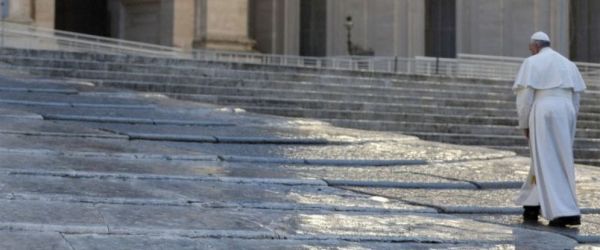Today’s liturgy invites us to celebrate the feast of the Nativity of Saint John the Baptist. His birth is the event which illuminates the life of his parents, Elizabeth and Zechariah, and engages his kindred and neighbours in joy and wonder. These elderly parents had dreamed and even prepared for that day, but they were no longer expecting it: they felt excluded, humiliated, disappointed: they were childless. Faced with the announcement of the birth of a son (cf. Lk 1:13), Zechariah was incredulous because the laws of nature did not allow it. They were old, they were elderly. Consequently, the Lord rendered him mute for the entire gestation period (cf. v. 20). It was a sign. But God does not rely on our reasoning and our limited human abilities. We must learn to trust and be silent before the mystery of God and to contemplate, with humility and silence, his work which is revealed in history and often exceeds our imagination.
And now that the event comes to pass, now that Elizabeth and Zechariah experience that “with God nothing will be impossible” (Lk 1:37), their joy is great. Today’s Gospel reading (Lk 1:57-66, 80) announces the birth and then pauses on the moment of the bestowal of the child’s name. Elizabeth chooses a name that is foreign to her family’s tradition and says: “he shall be called John” (v. 60): a freely given and, by then, an unexpected gift, because John means “God has given grace”. And this child will be a herald, a witness to God’s grace for the poor who, with humble faith, await his salvation. Zechariah unexpectedly confirms the choice of that name by writing it on a tablet — because he was mute —, and “immediately his mouth was opened and his tongue loosed, and he spoke, blessing God” (v. 64).
The entire event of the birth of John the Baptist is surrounded by a joyous sense of wonder, surprise and gratitude. Wonder, surprise, gratitude. The people are filled with a holy fear of God “and all these things were talked about through all the hill country of Judea” (v. 65). Brothers and sisters, the faithful people sense that something great has occurred, even though it is humble and hidden, and they ask themselves: “What then will this child be?” (v. 66). The faithful People of God are able to live the faith with joy, with a sense of wonder, of surprise and of gratitude. We see those people who spoke well about this marvelous thing, this miracle of John’s birth, and they did so with joy, they were happy, with a sense of wonder, surprise and gratitude. And looking at this, let us ask ourselves: how is my faith? Is it a joyous faith or is it a faith that is always the same, a ‘dull’ faith? Do I feel a sense of wonder when I see the Lord’s works, when I hear about evangelization or the life of a saint, or when I see many good people do I feel the grace within, or does nothing move in my heart? Am I able to feel the Spirit’s consolation or am I closed off? Let us ask ourselves, each of us, in an examination of conscience: How is my faith? Is it joyful? Is it open to God’s surprises? Because God is the God of surprises. Have I ‘tasted’ in my soul that sense of wonder which the presence of God brings, that sense of gratitude? Let us think about these words which are the moods of faith: joy, a sense of wonder, a sense of surprise and gratitude.
May the Blessed Virgin help us to understand that in each human person there is the imprint of God, the source of life. May she, Mother of God and our Mother, make us more aware that in having children parents are acting as God’s assistants. It is a mission that is truly sublime, which makes each family a shrine of life, and it — each child’s birth — awakens joy, wonder and gratitude.
[Pope Francis, Angelus 24 June 2018]












